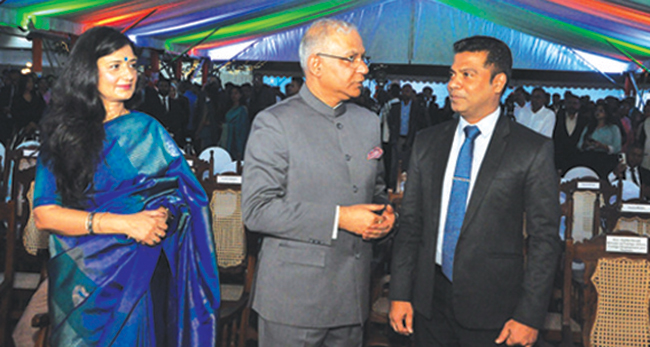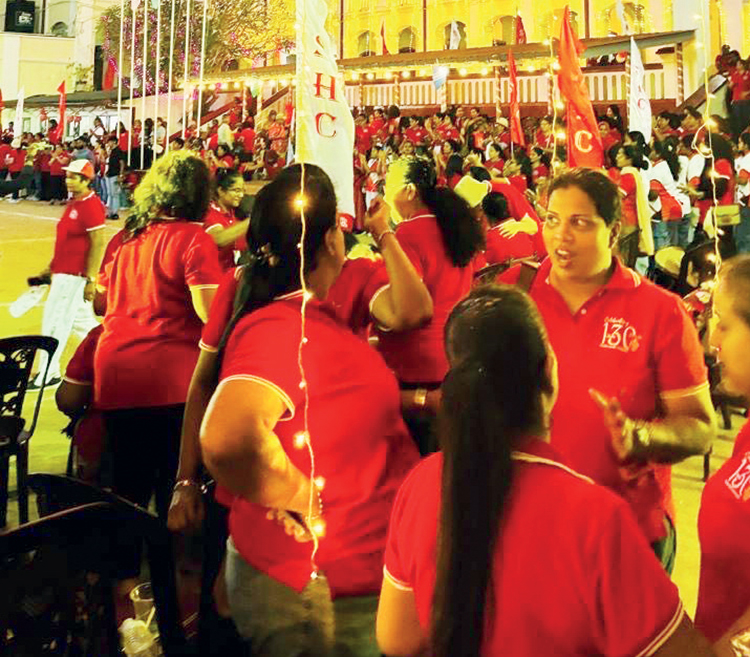Life style
Ambarella Fruit : Discover The Wonderful
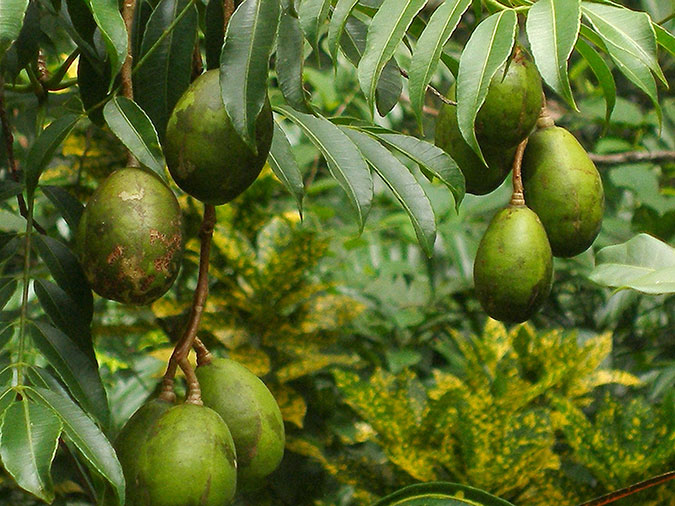
Ambarella, scientifically termed as Spondias dulcis, is a tropical fruit-bearing tree that goes by several common names including June plum, golden apple, dwarf golden plum. This succulent summer produce confers numerous advantages for human health, such as enhancing immune system functions, preventing heart ailments like atherosclerosis, myocardial infarction or heart attack, enriching skin texture, maintaining optimal vision and remedying gut problems.
The ambarella crop thrives in hot, humid climates in tropical zones. It grows extensively in warmer parts of Asia and Africa, in many countries including India, Sri Lanka, Malaysia, Thailand, Indonesia, Jamaica and Barbados. The ambarella tree is usually very tall, reaching a height of up to 20 m with branches that hold deciduous pinnate leaves. In the blooming period, the tree bears small, bright white-coloured flowers, that eventually bud into oval, green, or yellow fruits. The ambarella fruit is popular summer produce in many regions in India, much like the ubiquitous mangoes. The raw, green fruits are a bit sour in taste, hence they are sun-dried and made into jams and pickles, or eaten with salt and spices. The ripe yellow fruits have a delicious, crispy inner flesh, with a fibrous pit i.e a large seed in the center and are enjoyed in fruit salads as well as puddings and pastries.
Ambarella fruits display an impressive nutritional profile, being abundant in water content, proteins, healthy fats, natural sugars as well as vitamins C, A. Moreover, this exotic summer harvest is a treasure trove of essential minerals like calcium, phosphorous, iron besides potent antioxidants namely flavonoids, terpenoids, tannins, saponins and cardiac glycosides.
It comes as no surprise then that ambarella fruits are sought out and consumed by many, for their marvellous health incentives, in addition to their immense therapeutic potential. Ambarella Fruit Health Benefits:
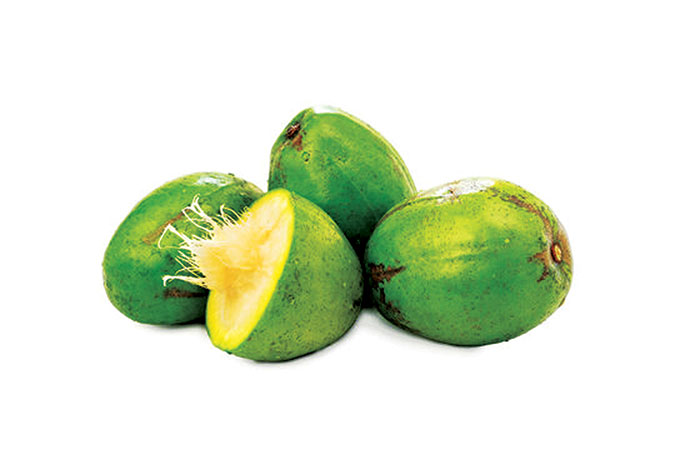
Augments Heart Function
Ambarella is blessed with the goodness of cardiac glycoside group of antioxidants. These plant compounds help to maintain normal blood pressure levels, thereby averting the risk of hypertension or hypotension. They also enable smooth flow of nutrients via blood vessels, preventing instances of bad LDL cholesterol clogging in the arteries, thus effectively keeping cardiac ailments at bay. Also Check Out: Amazing Foods To Reduce LDL Cholesterol – Infographic
Bolsters Immunity
Being inherently rich in vitamin C content, besides iron, ambarella works wonders to maintain defense mechanisms in the body. Eating the ambarella fruit or even having a side of a pickle with meals assists in the synesis of healthy white blood cells, required for combating foreign invaders and infections in the body. Vitamin C also improves the absorption of iron in the bloodstream, essential for healthy red blood cell synthesis as well as preventing anaemia and fatigue.
Cures Digestive Issues
Ambarella is packed with beneficial antioxidants such as flavonoids, terpenoids and tannins. These work in synergy to foster easy digestion, besides treating a host of common gastrointestinal complaints like bloating, indigestion, flatulence. The best time to eat ambarella is before a heavy meal of breakfast or lunch, to help activate gastric juices in the stomach and facilitate smooth assimilation of food.
Improves Eyesight
Bestowed with profuse amounts of vitamin A, ambarella fruits can be consumed regularly as part of the diet to help promote healthy eyesight in children and adults. Squeezing the pulp into a juice, adding a few slices to a salad, or simply biting into the ripe June plums on a regular basis lowers the risk of age-related macular degeneration (AMD) and other vision problems in the later years.
Combats Skin Infections
The wealth of antimicrobial agents in ambarella fruit tackle common skin conditions such as dryness, psoriasis, rosacea and other blisters and wounds. Moreover, the antioxidants in June plum stimulate collagen synthesis, thereby slowing down ageing and diminishing wrinkles and fine lines.
Health Benefits of Ambarella
Leaves and the bark of ambarella are widely used as a therapeutic agent as it contains flavonoids, saponin and tannins. Fruit is dense in nutrients and improves overall health. One serving of ambarella fruit provides 48Kcal of energy, 1 gram of protein, 12 grams of carbohydrate, 233 IU of vitamin A, 30mg of vitamin C, 15 mg of calcium, 3 mg of iron and 22 grams of phosphorus. The fruit also contains dietary fibre and Vitamin B complex constituents like thiamine and riboflavin. Listed below are few of the health benefits of Ambarella
Helps Treat Cough
Leaves extract are quite beneficial for treating cough. About 3 or 4 fresh leaves of ambarella tree is boiled in two cups of water and allowed to stand for few minutes. The concoction is strained and usually taken with honey.
Fruit can also be used to treat cough. Two or three pieces of the ambarella fruit are shredded and the water is squeezed. A pinch of salt can be added to the extract and consumed thrice a day to relieve cough.
Controlling cholesterol levels
The fruit consists of good amount of vitamin C which helps to metabolize cholesterol into bile acids, which may have implications for blood cholesterol levels and the incidence of gallstones. So this fruit with vitamin C useful to control your cholesterol levels.
Life style
India’s Republic Day

India’s Republic Day was celebrated in a spirit of unity and pride, as guests gathered to mark India’s democratic journey and its enduring commitment to freedom, diversity and progress.
India House came alive in hues of saffron, white and green as the 77th Republic Day of India was celebrated with stately elegance and heartfelt pride Set against the manicure lawns of the High Commissioner’s official residence, the annual ceremony unfolded as a graceful reminder of India’s enduring democratic spirit and its close time honoured ties with Sri Lanka.
The morning ceremony commenced with the ceremonial unfurling of the Indian Tricolour. As the anthem echoed across the grounds, dignitaries, diplomats and members of the Indian Community stood united reflective on the ideals enshrined in the constitution of India, Justice, liberty, equality and fraternity. Adding cultural depths to the occasion was patriotic and classical performances thoughtfully curated to reflect India’s rich artistic heritage.
The evening reception had invited guests, diplomats, members of Parliament and many other distinguished guests. From traditional silk saris and sherwanis to chic evening gowns and tailored suits embodying a seamless blend of culture and continue.
The reception also offered a taste of India’s culinary artistry, with meticulously curated cuisine by Taj Samudra Colombo reflecting regional flavours with a modern twist.
Among the distinguished guests were the Prime Minister, Former Presidents, Ambassadors whose presence underscored the evening diplomatic and cultural significance.
The chief guests was the Minister of Health and Mass Media Dr. Nalinda Jayatissa. The evening reach a memorable cresendo as the High Commissioner of India to Sri Lanka and Maldives delivered a speech emphasising India’s journey, its democratic value and its role on the global stage. He also spoke about the close ties between India and Sri Lanka, cultural exchanges and growing economic and strategic partnerships, reinforcing the special friendship between the two nations.
Pix by Thushara Attapathu
By Zanita Careem
Life style
Once a Heartian always a Heartian: Celebrating 130 glorious years
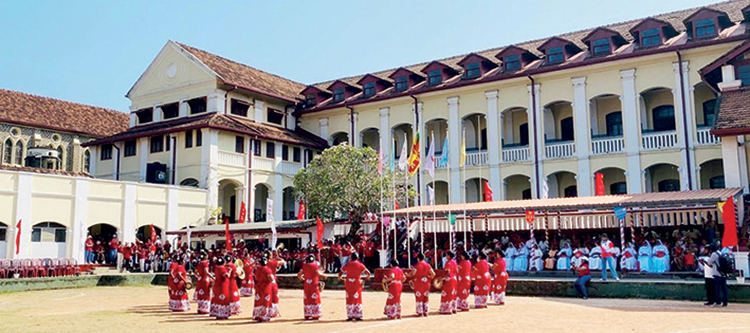
This year, Sacred Heart Convent Galle celebrated 130 years of excellence, and the occasion was nothing short of spectacular. Alumnae, fondly called the old girls, walked the corridors of memory, reliving the elegance, discipline and camaraderie that shaped their youth. Founded by visionary Belgian nuns over a century ago, Sacred Heart Convent began with a clear mission of nurturing not only intellect, but also character, compassion and confidence. Today it stands as a timeless symbol of holistic education, blending its rich heritage with a modern vision.
There’s a magic in returning to the place where your story began – the echo of footsteps in old halls, the chatter of friends, the quiet thrill before assembly and the sense of belonging that never fades. This year as Sacred Heart Convent Galle celebrates 130 years of excellence. I found myself walking through memories that shaped not only my education but my outlook in life.
Founded over a century age by dedicated Belgian nuns, Sacred Heart Convent began as a humble institution with a bold vision to nurture intellect, character and compassion in equal measure. Set against the picturesque backdrop of Galle, with its charm and timeless beauty, the Convent became more than a place of learning, it was a sanctuary of discipline, creativity and grace.
My earliest memories of the school are vivid. I remember the feel of my uniform on the first day, the nervous excitement, as we walked into classrooms that I will always remember Sister Adrian’s warmth, guidance and encouragement . Her presence made every lesson meaningful and every Heartian feel truly cared for.
Galle itself added a special charm to the celebrations. The gentle sea breeze, the sunlit ramparts and the serene landscape created a perfect backdrop for a day filled with memories and nostalgia.
The 130 years of celebrations were a tribute to this legacy – an ode to the school’s enduring influence and the generations it has inspired.
The familiar bell at Sacred Heart Convent rang with a deeper resonance this year, calling together generations bound by faith, discipline and shared memory. As the institution marked 130 years of distinguished service in education, the celebrations unfolded not merely as an anniversary, but as a heart felt homecoming- a return to corridors where values were shaped and lifelong friendships were born. The alumnae returned in style, sharing laughter and stories of classroom adventures, chapel recitals and play ground friendships.
The highlights of the event this year was made memorable by a much loved Back to School theme that turned time gently backwards, Old girls arrived dressed in thier school day best, laughter filling the quadrangle as familiar bells , laughter, memories marked the back to school scene .
At the heart of the foundation of the school was Sister Adrian ,the devoted Belgian nun who served as principal, she had vision, discipline and unwavering dedication that was the the cornerstone of Sacred Heart’s legacy. Generations of students carry forward her values and spirit she instilled over a century ago.
I found myself reminiscing about my own journey within its storied walls – the classrooms, the assemblies, the playground games and shared seats with friends that still bring a smile today. I remember the guidance of teachers who inspired curiosity and the gentle discipline of mentors who shaped our values.
The ‘Back to School’ feeling during the 130th celebrations was magical seeing Alumnae return, glowing with nostalgia reminded me how the spirit of Sacred Heart stay with us and remains etched in our hearts.
As the celebrations came to a close, I felt a profound gratitude for the school, for the Belgian nuns who laid its foundation For the present Principal Sister Sandya Fernando and Sister Mihiri Perera, Deputy Principal and Head of the Primary School and the teachers who carry forward this century old tradition with dedication and warmth. Their commitment to keeping the school’s spirit vibrant, bridging the gap between the history and the present. From Sister Adrian’s vision to the care of today’s dedicated sisters, Sacred Heart Convent has spent 130 shaping minds, nurturing values and inspiring generations.
For me, Sacred Heart Convent was never merely a place of learning; it was a canvas, a stage and a sanctuary, a place that taught me education is as much character as it is about knowledge.
As the school celebrated 130 glorious years, we salute Sister Adrian, and the visionary leadership of the current principal and Vice principle Thier dedication have shaped generations of Heartians, instilling values, courage and compassion For me this celebrations stirred cherished memories and a reminder that the heart of Sacred Heart beats strong, carrying its legacy forward with pride and love
By Zanita Careem
Life style
Fathuma Marleen on style, strength and grace

Threads of influence
From the buzz of a busy salon chair to the delicate precision of couture hand work, Fathuma Marleen carved a space where style,skill and sophistication intertwine.
Her signature lies in the subtle artistry of her embroidery and handwork. Every stitch, every embellishments reflect a dedication to precision and an eye for detail cultivated from her earliest days A guiding force for women she touches human lives with generosity,empathy and unwavering commitment
Fathuma Marleen’s story begins not on a runway,but behind a salon chair,scissors in hand,hair falling softly to the floor,and dreams quietly taking shape .As a young hairdresser,trained by Janet Balasuriya , she learned early the art of transformation:how confidence blooms when a woman feels seen,styled and celebrated. That intimate understanding of beauty,personal,emotional and deeply human later became the backbone of her creative journey.
But her creative spirit couldn’t be confined to hair alone In a world driven by fast fashion and fleeting trends,Fathuma Marleen’s work caught the attention of established names in the couture world. Driven by an eye for fashion, she transitioned into stitching, turn ing fabric into statements of sophistication and glamour.She went on to sew for top designers and Colombo’s fashion conscious women, contributing behind the scenes to collections that demanded excellence, consistency and technical mastery. Though her role was discreet, her impact was unmistakable among the landscape of fashion,each of her designer clothing had her signature precision. Her signature touch soon became popular among top designers ,whether it’s a flowing gown, or an Indian Shalwar or a flowing abaya, her intricate,embroidery or her sleek cut had a story . Yet at the height of her creative journey, Marleen made a personal sacrifice,she moved away from her burgeoning fashion career to join her husband in his ambassadorial role to Riyadh.
A defining chapter in Fathuma Marleen’s professional journey has been her close alliance with the Women’s Chamber of Commerce and Industry WCIS, a platform that champions entrepreneurship, creativity and leadership among women. It was Nayana Karunaratne,her close friend with whom she co-created spectacular fashion shows stood firmly by her side encouraging,guiding and gently nudging her back towards her creative calling.
Her work gained particular prominence under the guidance and encouragement of Nayana, this partnership proved transformative, and Fathuma Marleen designs stepped into the spot
Notably her creations featured at the Chamber of Commerce, fashion show led initiatives, including high profile Abaya presentation showcased at the Hilton, which left the audiences mesmerised. Her creations unveiled marked a defining movement in her journey. Modern silhouettes,rich hues and intricate embroidery,
clear lines, thoughtful detailing, appealed to modern woman who values both tradition and contemporary style. The collection resonated strongly with the audience. This show was a celebration of Marleen’s return to the spotlight The Hilton shows stood as a turning point-proof that Marleen’s design journey had depth,direction and a story still unfolding.
When her husband’s diplomatic posting took the family to Riyadh. Fathuma Marleen embraced a new chapter, one that required poise, adaptability and cultural awareness.
As an Ambassador’s wife she navigated formal responsibilities with elegance, balancing public engagements, all while maintaining her creative pursuits but limited due to new responsibilities ,yet she remained a quiet force in style and women’s empowerment,balancing diplomacy and creativity
Through it all, she remained committed to family. Her three daughters each now accomplished doctors and son Banker in the US were nurtured in an environment of discipline.
She says ‘ my family remains my cornerstone a source of pride and inspiration’. She cherishes her children and grandchildren, who continue to inspire her with thier own passions and achievements Beyond fashion, she is a dedicated social worker and champion of women,turning every endeavour into a celebration of creativity,sophistication and style. Beyond glamour, Fathuma is a woman driven by compassion. She devotes herself to running an orphanage established by her husband,carrying forward his vision and touching countless lives.
- Every stich tells a story of elegance
- Where elegance meets modesty
- Fathuma turned runways into celebrations of women and style
- Flow,flair and finesse
By Zanita Careem
-

 Opinion6 days ago
Opinion6 days agoSri Lanka, the Stars,and statesmen
-

 Business7 days ago
Business7 days agoClimate risks, poverty, and recovery financing in focus at CEPA policy panel
-

 Business5 days ago
Business5 days agoHayleys Mobility ushering in a new era of premium sustainable mobility
-

 Business2 days ago
Business2 days agoSLIM-Kantar People’s Awards 2026 to recognise Sri Lanka’s most trusted brands and personalities
-

 Business5 days ago
Business5 days agoAdvice Lab unveils new 13,000+ sqft office, marking major expansion in financial services BPO to Australia
-

 Business5 days ago
Business5 days agoArpico NextGen Mattress gains recognition for innovation
-

 Business4 days ago
Business4 days agoAltair issues over 100+ title deeds post ownership change
-

 Business4 days ago
Business4 days agoSri Lanka opens first country pavilion at London exhibition


